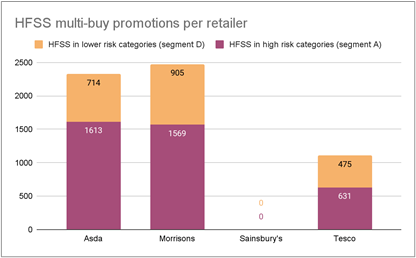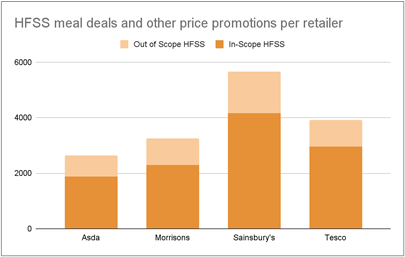(Thursday 9th December, London) New research has found that UK supermarkets are heavily promoting unhealthy food and drink products in their online stores.
Over a five week period from August to September this year, research foundation Questionmark tracked all promotions of food products in the online stores of the four biggest UK supermarkets - Asda, Morrisons, Sainsbury's and Tesco. It analysed the health profile of these products, using the UK Government’s Nutrient Profiling Model, which assesses whether products are high in fat, sugar and/or salt (HFSS).
The research found that the Big Four supermarkets ran 48,600 food promotions for approximately 11,700 distinct food products in total. Over 21,000 (43%) of these promotions were for less healthy (HFSS) products. Sainsbury's and Morrisons ran the most promotions for HFSS products in total: each approximately 5700 over five weeks, closely followed by Asda and Tesco with each about 5000 promotions.
Ready for regulation?
The study also assessed which supermarkets were best prepared for new health legislation approved by the UK parliament last month, restricting the most harmful online and in-store promotions of HFSS products by price and location.
The Food (Promotion and Placement) Regulations will ban multi-buy promotions of products high in fat, salt or sugar (HFSS), in product categories that are considered to contribute significantly to children's calorie intake. These include chocolate, crisps, sweets and soft drinks.
The research found that Sainsbury’s is the only supermarket well prepared for the new restriction, having already ceased multi-buy promotions of all HFSS products. By contrast, the other major supermarkets still rely heavily on promotions that will be banned under the new measures. Asda and Morrisons each ran over 300 of these promotions per week, on average. At Tesco the number was more moderate with 120 such promotions per week on average.
Figure 1: HFSS multi-buy promotions per retailer (over 5 week period)

However, the research found that Sainsbury’s has not stopped promoting unhealthy products, but rather shifted its strategy away from multi-buy promotions towards meal deals and other price promotions, which will not be addressed by the new regulation. In the research period, Sainsbury’s ran over 1100 such promotions for HFSS products per week – far more than its rivals - including over 800 promotions in categories particularly relevant to children.
Figure 2: HFSS meal deals and other price promotions per retailer (over 5 week period)

From a health perspective, this increase does not nullify the benefits of refraining from multi-buys. Research by Public Health England has shown that a plain price reduction may cause a 14% increase in consumption but multi-buys can lead to up to 22% increase. Nevertheless, the authors say that “the shift that seems to have taken place in Sainsbury's promotion strategy may considerably weaken the effectiveness of their policy on multi-buys.”
As such, the report recommends that UK policymakers should consider including price promotions and meal deals within the scope of the legislation.
Ignacio Vazquez, Senior Manager at ShareAction said: “With two in every three pounds spent in food going to supermarkets, these companies have a major influence on the nation’s eating habits. By better integrating considerations around nutrition in their promotional and marketing strategies, progressive retailers can stay ahead of growing regulation in this space while driving improvements in public health outcomes.”
Charlotte Linnebank, director Questionmark said: “Superlist Health 2021 shows that the new legislation leaves ample room for individual supermarkets to lead the way towards a healthy food environment. Our research findings confirm the importance of improving transparency across supermarkets’ current practices.”